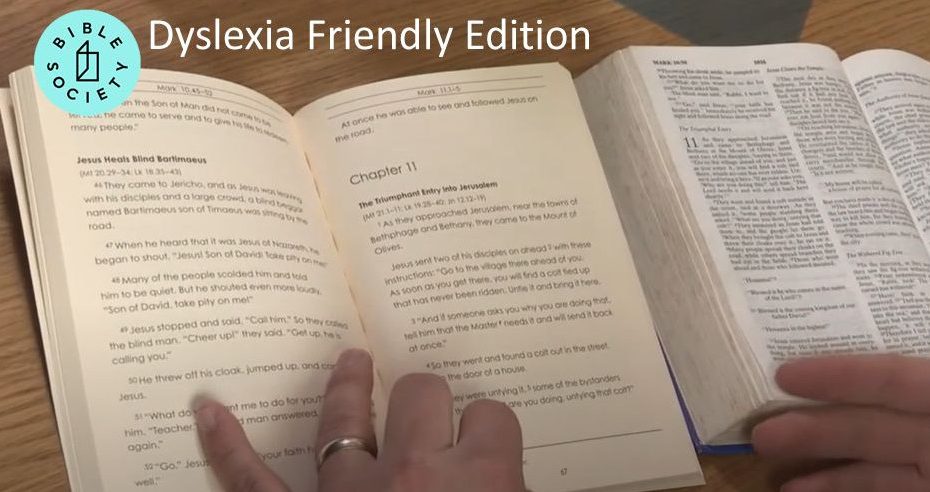Do Dyslexics need specialist Bibles, understanding from churches, or both? Dyslexia is a condition that makes it hard for people to read and write easily. It has been recognized for over 100 years and now some countries even have laws requiring schools, employers or providers of public services to make adjustments to help people for whom dyslexia is a barrier. (Unfortunately, even in the wealthier countries the level of support does not meet the demand.)
Dyslexia friendly Bibles
For many generations printed Bibles have used small print on thin paper. This makes them easy to carry but not always easy to read, and if for any reason you already find reading difficult, this can just make it harder. In 2015 the British and Foreign Bible Society began publishing their Good News Bible in a more dyslexia friendly format following design guidelines from the British Dyslexia Association and making the text larger, clearer, with better line spacing and printed on thicker paper so that text on the other pages doesn’t show through. The translation they used is already one that uses slightly simpler English and shorter sentences than some other translations.
Their page on Scripture for Everyone includes information and frequently asked questions about their Dyslexia-friendly Bible format, as well as the Easy English Gospels, designed for people who are learning English as a second language, and the New International Readers Version Accessible Edition with even larger print.
Other publishers have also started to produce dyslexia friendly versions, using special fonts. Although some people are very positive about them, these fonts appear to be designed on a discredited idea that dyslexia is mainly a visual problem (an idea first suggested back in 1927). An article by Youki Terada asks “Do Dyslexia Fonts Actually Work?”, and suggests that they can sometimes cause more harm than good, compounding feelings of failure if it builds up a high expectation that then doesn’t result in improvement. So, it’s important not to tell people that a special font or differently formatted Bible alone will take away their difficulties.
Some people (but not everyone) also find reading on a phone or tablet easier because the Bible apps such as those from YouVersion and Faith Comes By Hearing allow you to adjust the size and spacing of the text as well as adjusting the colour, brightness and contrast of the screen.
Bible apps also provide what seems like a clear help for anyone who has difficulty in reading the Bible. They allow you to listen to it being read. This certainly is something that many people appreciate and there is an amazing selection of free audio Bibles. There are specialist audio players and Bible apps can make listening easier by allowing you to control the speed. Having the Bible read to you is a different experience to reading it for yourself. Some people really find it helpful, some don’t. Some people with dyslexia also have auditory processing issues and may need longer to make sense of what they are hearing. I have wondered if new approaches in Oral Bible Translation might help some dyslexic people. There is no direct research yet, but is perhaps something to be explored. Fortunately, there are a number of dyslexic Christians exploring ideas and doing high level research themselves.
Dyslexia friendly Churches
Scottish author, Aurora Betony suggests that whatever changes publishers make, what may actually be needed are not just dyslexia friendly Bibles but Dyslexia friendly churches. She highlights legislation in the UK and other countries about requirements to make reasonable adjustments for people with disabilities. Even without legal backing Aurora and others make strong theological cases for greater disability inclusion. She has written a Guide for Dyslexia friendly churches, and Tips on taking in and remembering Bible content based on her own experience and wider study.
Her guide explains how the following help her to engage with the Bible.
1) A translation or paraphrase in contemporary language
2) A multi-sensory approach
3) An interactive approach
4) Gradually building her learning of each passage in small steps
5) ‘Overlearning’ Bible content
6) A flexible approach
7) An approach that is realistic for her
Dyslexia friendly schools, workplaces and communities
Attitudes, approaches, and resources vary around the world. In places where people don’t know about dyslexia, people who struggle to read can often be made to feel stupid or lazy, especially if they have had the same opportunities to learn as people who read well. People with dyslexia can be just as intelligent as other people, and sometimes they have other skills – both natural abilities, and skills they have developed to help them get around their difficulties. Some adults with dyslexia have stopped hiding their condition and campaign for greater understanding and support. Our earlier post listed some of the strengths and difficulties associated with Dyslexia, and a web search about dyslexia in your own or someone else’s country may help you learn more about attitudes, challenges and opportunities. As with everything on the internet there will be a mix of good and bad advice.
One study by Mathers, White and Youman, 2020 looked at what was on the first few pages of a Google search for Dyslexia for 195 countries.
I’m influenced by attitudes and approaches in my own country. The intro video at https://www.bdadyslexia.org.uk/dyslexia provides a simple overview, but I found the real life stories in their short video Dyslexia: a differently wired brain more powerful. Dyslexia isn’t just about neurobiology and accommodation strategies, it’s about people.
Written by Peter Brassington,
Peter is not dyslexic but has been exploring this issue as he and others explore issues of Bible Translation and Neurodiversity.
This will be reposted along with other research and reflections on his own blog at brassingtons.wordpress.com/neurodiversity/
